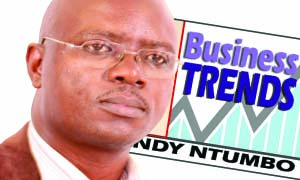PROFESSIONALS globally, are expected to make contributions to the long-term well-being of their organisations and underlying nations.
In late November 2009, I was privileged to attend the annual national development Conference of the Zambia Institute for Policy Analysis and Research, Lusaka.
This conference was officially opened by then Bank of Zambia (BoZ) governor Caleb Fundanga.
In his address, the former Central Bank governor noted that there were declining levels of professionalism in Zambia.
“You will agree with me that the levels of professionalism in our country have somewhat declined in the recent past. Nowadays, it is not rare to hear of corrupt practices and unethical conduct in the both the public and private sectors.
“This has no doubt compromised professionalism,” Dr. Fundanga said.
He then implores professionals to embrace high levels of professionalism to make remarkable contributions to their organisations and the country’s development.
Imagine, that was 12 years ago!
What would he have said if this conference was going to be held today?
The discourse will look at a number of hair-raising incidences that have exemplified the need for organisations to increasingly embrace professionalism as part of their in-built daily values and practices.
Indeed, looking at the recent past decades, organisations and nations and have made remarkable progress and development.
These developments are clearly a result of the effort and contribution of professionals from various trades and professions.
Notwithstanding these developments, there have been high profile incidences in Zambia’s corporate businesses, national economy which are symptomatic of “professional decay’’.
These incidences if not addressed from the roots, threaten the long-term survival of corporate business organisations and the nation at large.
How else do you explain last year’s incidence at one of the country’s major cement manufacturers where the Zambia Compulsory Standards Agency (ZCSA) recalled truckloads of cement after failing quality conformity tests?
Additionally, how else would you explain the recent month’s media reports of incidences of companies supplying expired drugs and condoms to the public health sector?
As earlier alluded to, South Africa Airways (SAA) experienced repeated incidences from the late 1990’s, of its inability to fly on time, declining levels of in and off-flight service, poor refreshments and food and higher airfares compared to its competitors.
Think about it, in all the above, SAA operations, flights, catering, administration, finance, operations are specialised areas of professional expertise!
Poor in-flight refreshments, unfriendly service, and late departure of flights surely fall short of professional service.
Where were the professionals?
What was the role of each and every professional in SAA, the named cement manufacturer and the recent reported medicines scandal?
What were these professionals trained to do?
What ethics and values do they espouse in their respective professions and jobs?
The K1 trillion question is, where are professionals when corporate businesses and national economies are facing challenges?
Are professionals in Zambia: lawyers, accountants, teachers, medical doctors, economists and many others, part of the problems those organisations and the nation faces or are they part of the solution?
Global businesses increasingly face onerous issues of transparency, accountability, ethics and value in the conduct of their activities.
This in turn places onerous demands on professionals in respective business organisations and economies to conform to the above demands.
Imagine, at the re-instatement of the market economy in 1989, companies and government officials in the Czech Republic gradually realised that professionalism; ethical business conduct, was an important factor influencing the overall quality and international attractiveness of the country’s business environment.
Further, it became clear that a culture of ethical practices was an important consideration for foreign companies envisaging bringing their business to Central Europe.
They have over the decades discovered that an increase in the corporate value index has clearly been associated with improved firm performance in market-to-book value.
High levels of organisational performance were found to be directly attributable to high levels of applied corporate and individual ethics
Think of it, all companies, and public sector institutions typically comprise the role of various individual and groups of professionals.
This therefore means that the habits, beliefs, norms, values and ethics espoused by these individuals and groups of these professionals determine how these business or nation’s governance, property rights, rule of law, business contracts, business transactions and financial markets will typically operate and be enforced.
Imagine an ecosystem where professionals believe that for one to get a job, business contract, a promotion, or have a court case ruled in one’s favour; one has to use an under-hand method!
Additionally, think of another scenario where individuals divorce themselves from their professional ethics and values in the execution of their work.
On the other hand imagine the contribution that would go to respective business organisations when professionals decide to espouse deep –rooted convictions of integrity, honesty, being hard-working, fairness, selflessness and justice in the daily execution of their work.
When all is said and done, it’s imperative on policy makers, economic managers, corporate business leaders, professional associations and institutes to actively promote professionalism to achieve further organisational and national economic growth.
For comments email: ntumbograndy@yahoo.com Mobile +260977403113 +260955403113
The author is the Managing Consultant at G. N Grant Business Consultant, a Chartered Certified Accountant (ACCA), a Master of Business Administration (MBA) holder, with a Specialism in Strategic Planning, and a candidate for the Herriot Watt University (Scotland) Doctor of Business Administration (DBA)







